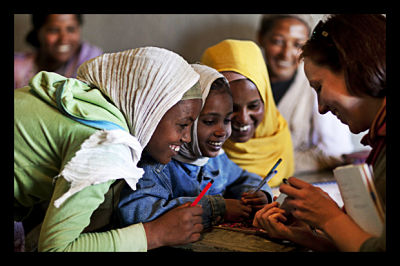Berhane Hewan: Ethiopia Gives Girls a Future

In 2004 the Berhane Hewan project was established in one community in Ethiopia to empower adolescent girls. The program is now considered award-winning by the U.N. Population Fund (UNFPA) and has expanded into 36 communities in Northern Ethiopia. Child marriage is a major issue in the Amhara Region of Northern Ethiopia and the Berhane Hewan project seeks to educate girls about the dangers associated with early marriage and their rights as women. Almost half of the female population of this region is married before they are 15 years old and many girls are also deprived of the chance of attending school because their families cannot afford to send them.
Child marriage can lead to girls being forced to have sex at too young an age, which causes health issues including premature pregnancy, high infant mortality, and difficult or even dangerous births. It also has many psychological ramifications as girls are forced into marriages with older men whom they do not know and have the traumatic experience of being forced into sex as adolescents.
The Berhane Hewan program addresses the issues associate with child marriage at multiple levels. Community-wide talks are held that encourage everyone to participate and learn about the ramifications of early marriage and health issues associated with young pregnancies and STDs. The program also provides financial assistance for girls to encourage them to stay in school and avoid early marriage. Informal educational groups have also been established so that girls unable to attend school can still receive schooling.
Girls are becoming aware of their rights and leaving isolated lives to join an empowered community of women. Zufan Fentahun’s marriage was annulled and with the help of Berhane Hewan, she was able to begin attending school and supporting herself with the sale of several animals and keeping a garden. Almost 12,000 girls have become involved with the project in some capacity and there is the potential to reach many more as it continues to expand. UNFPA has passed the program over to the U.K.’s Department for International Development who has increased funding and has ambitious plans to increase the number of communities involved.
– Zoë Meroney
Source: UNFPA
Photo: Take Part
